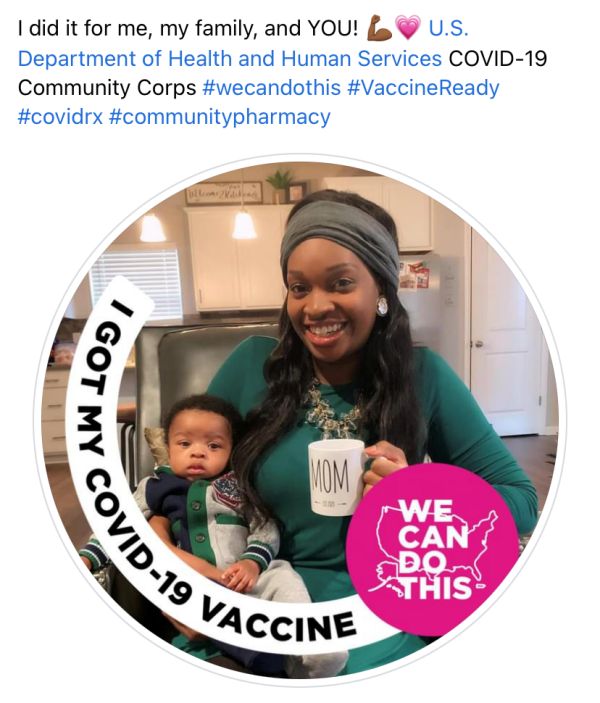Pharmacist Leads by Example and Uses Social Media to Educate Her Community

Omolola “Lola” A. Adeoye-Olatunde, PharmD, poses with her son to promote her COVID-19 vaccination through social media.
“There are many people from my hometown who outright refuse to get vaccines in general and are big advocates as to why people shouldn’t get them with no scientific premise,” said Omolola “Lola” A. Adeoye-Olatunde, PharmD, a proud Nigerian-American woman, who grew up working in her family-owned independent pharmacy in the midwestern United States. She has witnessed the positive influence pharmacy professionals can have on the health outcomes of community members. “[The people in] my community take care of themselves spiritually through what they eat and how they ground themselves. They don’t like to put their belief in man-made medications, like vaccines, and believe that homeopathic remedies will cure or prevent people from getting COVID-19,” she said.
Adeoye-Olatunde finds that good intent, transparency, and integrity, combined with representation, matters immensely. “Since there have been times in history when Black individuals have intentionally been withheld from treatment in trials and subsequently harmed, it is important to gain trust and convince them that we’re here to help and not cause harm,” she said.
Actively listening, while trying to understand concerns, bridges the gap between the patients’ cultural background and the best approach to assisting them with an illness or health care–related concern.
As a full-time assistant professor at Purdue University College of Pharmacy in Indiana, Adeoye-Olatunde believes the key to overcoming vaccine hesitancy is to educate and provide culturally relevant and audience-appropriate resources, whether locally or virtually through social media. In her community, she finds that sharing patient-friendly, evidence-based scientific information from trusted experts, who also come from minority backgrounds, helps patients understand different perspectives and feel empowered to make the best decision for themselves.
On the patient care front, Adeoye-Olatunde understands certain people will never change their mind, so she focuses on sharing her personal and professional experiences. “I took to social media to reach many people in my community who do not have access to the same educational resources as my professional circle,” she said. “I want to at least give them one example of someone who kind of made it to the other side, knows where she comes from, and feels confident in receiving the vaccine,” Adeoye-Olatunde said of her outreach efforts to her family, friends, and followers about informing them of her decision to get the COVID-19 vaccine and the comforting experience after receiving her first dose.
Practice Pearl
Positively leverage various social media platforms to show that you trust the science. Share your personal story and the aspects that went into your decision process for getting vaccinated.
Learn more
In one social media post, she expressed, “I was blessed to receive my 1st dose of the Moderna COVID-19 vaccine. I am a Black, Nigerian-American wife, mother (who is breastfeeding), sister, daughter, pharmacist, researcher, educator, and woman of faith. The intersection of all these things went into my decision of getting this vaccine. For me, the benefits of the vaccine overwhelmingly outweighed the potential risks.”
In efforts to provide resources to support others in her community to make an informed decision, Adeoye-Olatunde advises her followers to watch a YouTube video of a town hall meeting hosted by the Black Coalition Against COVID-19. The video features diverse professionals who answer many questions to help people in the community make informed decisions to get the vaccine. She also encourages anyone, not just health professionals, to sign up for the COVID-19 Community Corps (a campaign launched by the U.S. Department of Health and Human Services) to educate themselves and others on ways they can fight to end the COVID-19 pandemic.
From outreach efforts to Black, African-American, urban, socioeconomically disadvantaged, and underrepresented minority communities through a social media–focused public health approach, “I’ve learned that most success does not come from telling underserved minority communities what to do, but from equipping them with examples and credible and digestible information to aid in their decision to get vaccinated,” said Adeoye-Olatunde.
Through Adeoye-Olatunde’s social media efforts, she has reached thousands of individuals and continues to be a trusted community member for many people such as underrepresented, breastfeeding, and expectant mothers who reach out to her for invaluable advice and reassurance. “You never know what’s going on in the background with your social media presence…just keep doing it and trust that you are providing information and services to people who may really appreciate your perspective,” she said.
—Clarissa Chan
April 2021